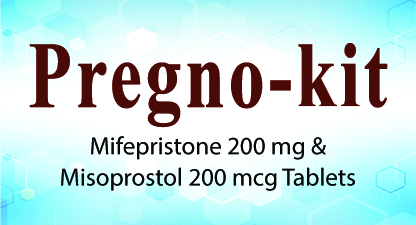PREGNO KIT
FDA and WHO approved combination pill for medical termination of pregnancy. Mifepristone is the progesterone receptor antagonist. Misoprostol is a synthetic prostaglandin E1 (PGE1) analog.
- Categories : Abortifacient
- Share Now :
PREGNO KIT – A combi pack of Mifepristone and Misoprostol
Composition: Each pack contains
- One tablet Mifepristone
Each uncoated tablet contains Mifepristone 200 mg
- Four tablets Misoprostol
Each uncoated tablet contains Misoprostol 200 mcg
Pregnancy Category: X
Presentation: Available in the pack size as 4 + 1 tablets X 1 blister
How does Pregno Kit work?
- Mifepristone blocks the hormone progesterone needed to maintain the pregnancy.
- As progesterone is blocked, the uterine lining begins to shed, the cervix begins to soften and bleeding may occur.
- After addition of Misoprostol, the uterus begin to contract expelling out the contents
- Finally leading to the termination of pregnancy.
Indications
- Medical termination of pregnancy
The recommended regimen for medical abortion
Women with undesired pregnancies ≤63 day’s gestation may be offered the option of the following regimen:
- Mifepristone 200 mg orally, followed by Misoprostol 800 µg vaginally administered once at any point 1–3 days later.
- Administering Misoprostol 6–8 hours after mifepristone appears to be equally effective.
Women with pregnancies of ≤49 day’s gestation who prefer the oral route of administration,
- Misoprostol may be administered as a 400-µg oral dose 2 days after mifepristone.
- Misoprostol 800 µg sublingually 2 days after mifepristone is another option for women who prefer to avoid vaginal administration, but they should be counseled about increased side-effects.
Confirmation of Termination
A follow up exam should be scheduled for confirmation of termination after 2 weeks of taking Mifepristone.
What to expect??
- One may bleed after taking Mifepristone; some women may bleed lightly while other may bleed heavily.
- Upon taking Misoprostol tablets, cramping, bleeding and clotting may begin as soon as 20 minutes.
- Within the next 6-8 hours most women suffer miscarriage.
- Cramping may come in waves with decreasing and increasing intensities.
Adverse Effects
Most of the side effects are due to misoprostol and includes:
- Heavy bleeding
- Nausea
- Headache
- Vomiting
- Heavy cramping
- Diarrhea
Contraindications
PREGNO KIT is contraindicated in the following populations and situations:
- In ectopic pregnancy*
- Intrauterine device (IUD) in place
- Chronic adrenal failure
- Concurrent long term corticosteroid therapy
- Hemorrhagic disorders* or concurrent anticoagulant therapy
- Inherited porphyria*
- Allergic to mifepristone, misoprostol or PG analogue.
Warnings and Precaution
- Vaginal bleedings may last for 9-16 days. Severe heavy bleeding may require medical attention.
- Serious bacterial infection or STDs should be identified.
- Vaginal bleeding do not confirm termination so clinical examination or ultra-sonographic scan should be done after 2 weeks of taking pills.
- After taking pill if termination didn’t occur then one should not bear child as there are chances of teratogenic effects.
Drug Interactions
- Ketoconazole, itraconazole, erythromycin and grapefruit juice may inhibit mifepristone and misoprostol metabolism.
- Similarly, rifampicin, dexamethasone, St. John’s Worts, phenytoin, phenobarbital and carbamazepine may induce mifepristone metabolism.
Patient Information
- Following termination one can be pregnant.
- Contraception can be initiated as soon as termination has been confirmed.
- It is unknown whether mifepristone and misoprostol are secreted in the milk or not, so one should consult a doctor if to discard the milk for some days.
*Terminologies:
Ectopic Pregnancy: Also known as tubal pregnancy, is a complication of pregnancy in which the embryo attaches outside the uterus.
Hemorrhagic Disorders: Spontaneous or near spontaneous bleeding caused by a defect in clotting mechanisms or another abnormality causing a structural flaw in the blood vessels.
Inherited porphyria: Refers to a group of disorders that result from a buildup of natural chemicals that produce porphyrin in your body.




